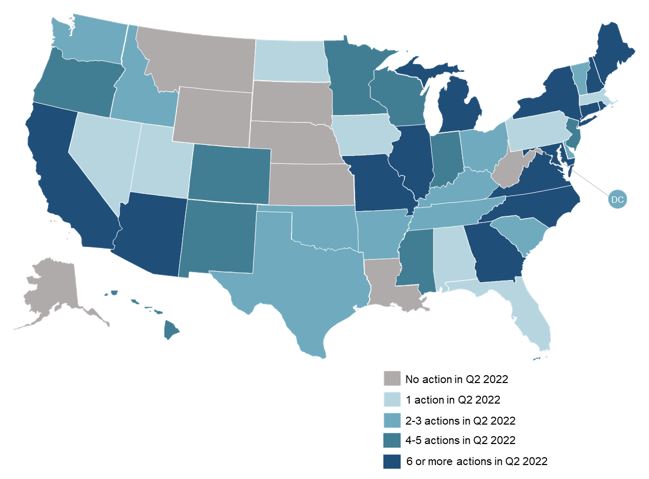The 50 States of Solar: States Explore Time-Varying Rates, Minimum Bills, and Value of Solar Studies During Q2 2022
Raleigh, NC – (July 20, 2022) The N.C. Clean Energy Technology Center (NCCETC) released its Q2 2022 edition of The 50 States of Solar. The quarterly series provides insights on state regulatory and legislative discussions and actions on distributed solar policy, with a focus on net metering, distributed solar valuation, community solar, residential fixed charges, residential demand and solar charges, third-party ownership, and utility-led rooftop solar programs.
The report finds that 42 states, plus the District of Columbia, took some type of distributed solar policy action during Q2 2022 (see figure below), with the greatest number of actions continuing to address net metering policies (68), community solar policies (63), and residential fixed charge or minimum bill increases (29). A total of 208 distributed solar policy actions were taken during Q2 2022, with the most actions taken in California, New York, Connecticut, Illinois, Maine, Virginia, Maryland, Missouri, and New Hampshire.
Q2 2022 Policy Action on Net Metering, Rate Design, and Solar Ownership

The report identifies three trends in solar policy activity taken in Q2 2022: (1) states examining time-varying credit rates for excess generation, (2) states returning to value of solar and cost-benefit studies, and (3) utilities proposing minimum bills for distributed generation customers.
“While there has been a lull in states conducting value of solar or net metering cost-benefit studies, a number of states are returning to these tools as they consider net metering reforms,” observed Autumn Proudlove, Senior Policy Program Director at NCCETC. “Idaho Power completed a value of DER study last quarter, and efforts are also underway in New Hampshire, Maryland, and Missouri.”
The report notes the top five distributed solar policy actions of Q2 2022:
- Florida Governor DeSantis vetoing a net metering reform bill;
- The Arkansas Court of Appeals striking down a grid charge approved by the Public Service Commission;
- Idaho Power completing its value of distributed energy resources study;
- Missouri lawmakers establishing a distributed energy resources task force; and
- Advocacy organizations filing petitions to clarify third-party ownership legality in Wisconsin.
“This quarter, we have seen some notable participation in ‘successor’ rule design for distributed generators. In addition to agency staff, regulators and utilities participating in cases, we also saw a coalition of rooftop solar installers contribute to a new stipulation with Duke Energy in NC,” says Policy Analyst Vincent Potter at NCCETC, ” In California, a number of mayors, city governments, and council members contributed to the public comments in the somewhat controversial proposed Net Energy Metering 3.0 program design.”
View the 50 States of Solar Q2 2022 Quarterly Report Executive Summary
View and Purchase the 50 States of Solar 2022 Q2 Update FULL Report
View other 50 States Reports – Solar, Grid Modernization and Electric Vehicles
ABOUT THE N.C. CLEAN ENERGY TECHNOLOGY CENTER
The N.C. Clean Energy Technology Center, as part of the College of Engineering at North Carolina State University, advances a sustainable energy economy by educating, demonstrating and providing support for clean energy technologies, practices and policies. It serves as a resource for innovative, sustainable energy technologies through technology demonstration, technical assistance, outreach and training. For more information about the Center, visit: http://www.nccleantech.